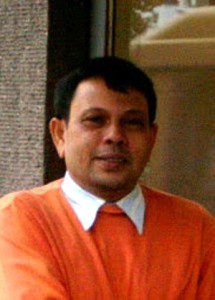Al-Fatiha: Edi Nasution February 1, 2018 – Posted in: In The News
 I have never personally met Edi Muhammad Yunus Nasution, better known as Edi Nasution, a Mandailing scholar and ethnomusicologist, even though I edited and wrote the foreword to his Tulila: Muzik Bujukan Mandailing (Areca Books, 2007), a study of Mandailing courtship and romance music. The closest I came to meeting him was during my last visit to Jakarta some years ago, but unfortunately, he was unwell. This was an omen of things to come. I did not know at the time that he was suffering from chronic diabetes, as he never let it on.
I have never personally met Edi Muhammad Yunus Nasution, better known as Edi Nasution, a Mandailing scholar and ethnomusicologist, even though I edited and wrote the foreword to his Tulila: Muzik Bujukan Mandailing (Areca Books, 2007), a study of Mandailing courtship and romance music. The closest I came to meeting him was during my last visit to Jakarta some years ago, but unfortunately, he was unwell. This was an omen of things to come. I did not know at the time that he was suffering from chronic diabetes, as he never let it on.
Meanwhile, life went on and I continued to correspond with him over email about matters concerning the Mandailings. I sometimes turned to him when I thought my other Mandailing informants were too busy or occupied. In time, he practically stopped replying to me and this really vexed me, as I wondered what I could have done to offend him. Little did I know that his health had taken a turn for the worse.
Years passed and unexpectedly, I learned of his passing in Tambang Bustak, Mandailing, on 23 March 2017, at a relatively young age, through a Facebook posting. His demise is, indeed, a great loss to Mandailing studies, particularly that of Mandailing music. I was to discover later through a fellow kinsman that his parents had brought him home to Mandailing when his condition had deteriorated; he had to leave his wife and children behind in Jakarta. As he was lying in bed, he shared on the virtual world his knowledge of matters Mandailing. Those thoughtful postings from a remote corner of our mutual homeland, and the many essays he penned in blogs, remain his lasting intellectual legacy.
But it’s his ‘well-crafted study [of the Tulila musical tradition] based on close organological observation and musical transcription,’ as remarked by Margaret Kartomi – specialist on the ethnomusicology of Indonesia and Southeast Asia and the world authority on the music of Sumatra – that is undoubtedly his most celebrated work. The publication of the Tulila book was made possible by generous sponsorship from Prof Martin Hatch, then professor of ethnomusicology at the Department of Music and Department of Asian Studies, Cornell University, Ithaca, New York, U.S.A. Dr Yeoh Seng Guan, a lecturer in the School of Arts and Science, Monash University, Kuala Lumpur, Malaysia, was also partial benefactor. Though both of them had never met Edi Nasution, they sponsored the book based on merit.
When Edi submitted his manuscript to me, it was in the form of his BA thesis to the Department of Ethnomusicology, the Faculty of Arts, University of North Sumatra. It so happened that Marty (nickname for Martin) was visiting Penang at the time. Aware that Marty had initiated and taught courses in music and musical traditions of Africa and Asia, including Indonesia, I asked him to peer review Edi’s work. Marty came back a few days later and stated unconditionally that the work was worthy of publication. Areca Books was only a year in its infancy at the time and I told Marty upfront that however much I would like to see Edi’s work in print, we were not flush with funds. Marty said not to worry and that when he went back to the States, he would raise the necessary funding. As it turned out, the funding came from his own pocket. That’s how Edi’s Tulila made it to the press. I have to thank Marty and Seng Guan for making it possible to bring Edi’s deserving work to light. If not for their benefaction, Edi’s study of tulila, the bamboo wind instrument, and markusip, the courtship and romance music, a rare cultural practice in the musical world, would have been lost.
Edi had predicted that the tradition would go extinct by 2010 with the demise of the few remaining practitioners. Now that we have lost the ethnomusicologist himself who documented the endangered tradition, the loss is irreversible. My attempts to get the Jakarta Arts Council to stage a performance of the Tulila by Edi when he was still around, in spite of the assurance that they would consider it, came to naught. I can’t help thinking that it was on account of the indifference of Java or Jakarta-centric fellow Sumatrans to the musical heritage of Sumatra. May Allah bless Edi Nasution for leaving us an unparalleled account of this bygone musical treasure for posterity. Al-Fatiha.
Abdur-Razzaq Lubis
1 Feb 2018
